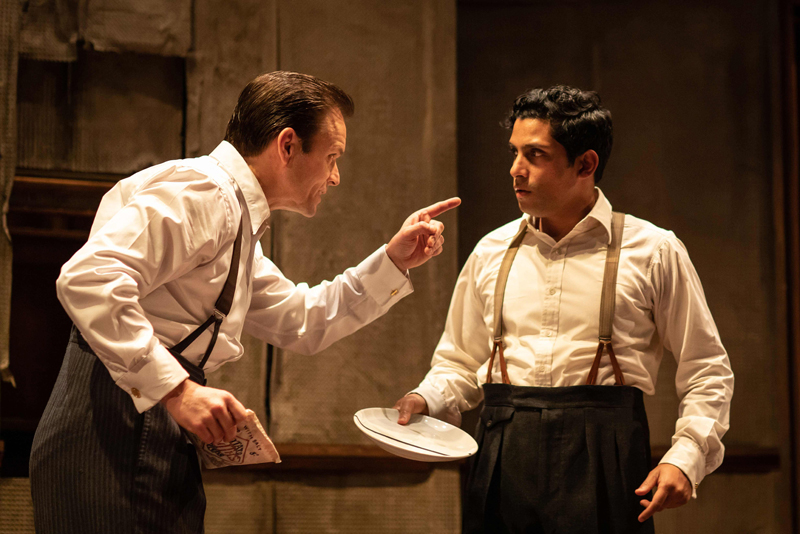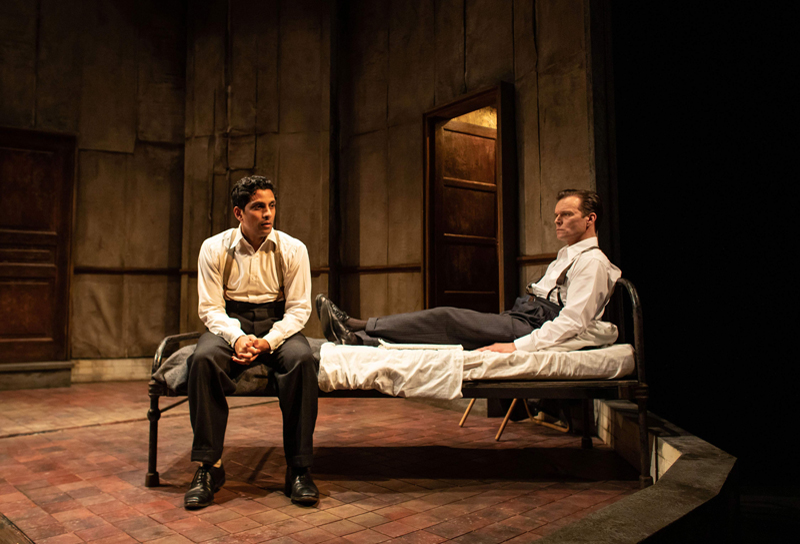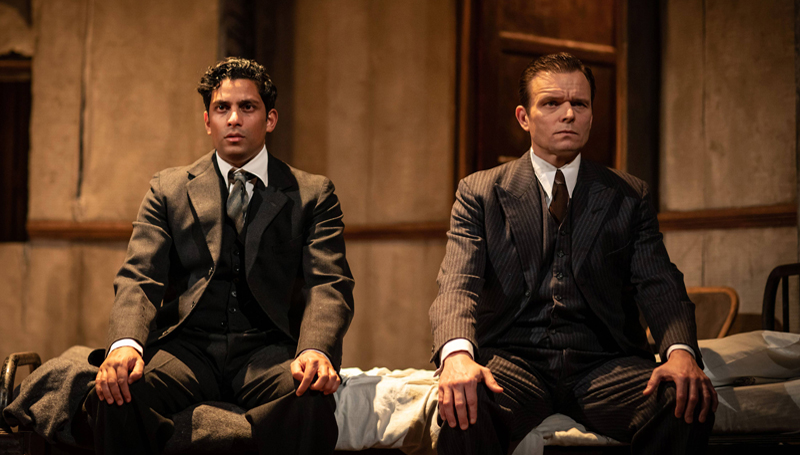“The Dumb Waiter”: Hampstead Theatre
Roxana Silbert, artistic director of Hampstead Theatre, has found a lovely way to burnish the reputation of this venerable playhouse by revisiting significant plays from its storied past. The world premiere of the one-act, two-hander The Dumb Waiter by a then-unknown playwright named Harold Pinter was part of the theatre’s first season in 1960 and proved an immediate sensation. The staccato rhythm of its language, the charged atmosphere of menace hanging over the most mundane conversations, and the subtle power shifts between working-class protagonists offered not only a new theatrical grammar but also a blueprint for Pinter’s subsequent work over the next half a century.
Review by Jay Paul Skelton.
10 December 2020
This new production of The Dumb Waiter — originally due to be staged last spring but forced to postpone due to the first coronavirus lockdown — finally opened in December to celebrate its sixtieth birthday and to confirm the Hampstead’s role in launching such a distinctive voice into the theatrical canon. Unfortunately, the run was cut short due to the pandemic’s winter surge, but the opening night illustrated how difficult Silbert’s dual goals to honour the past and respond to the present moment were to fulfil. ln other words, this revival of The Dumb Waiter directed by Alice Hamilton, though fresh in several ways, appeared unable to move beyond what might be considered problematic thinking in its approach.
The evening started well as a semi-circular curtain rose elegantly to reveal an exquisitely shabby set designed by James Perkins. The basement room described by Pinter in his stage directions was in this instance rendered beautifully as a former kitchen, which is to say one could see years of hard-to-define stains in the mottled red gutters criss-crossing the floor and smell the dampness of the walls in every buckle and warp. The titular device front and centre, although delightfully ramshackle in its construction, rose and fell with alarming speed and resonant thumps over the course of the evening. James Whiteside offered supportive lighting that not only allowed us to see the action but also created a sense of mystery in what might be hidden in the room’s corners and doorways. The cumulative effect was the creation of a suitably mundane yet menacing atmosphere that instantly embodied Pinter’s style of writing without a word being spoken in the few minutes after the curtain rose.

L-to-r: Alec Newman and Shane Zaza. Photo credit: Helen Maybanks.
It should also be said that The Dumb Waiter was a prescient choice given the circumstances related to the Covid-19 pandemic. l write this review in the midst of Britain’s third lockdown during which we’re required to confine ourselves to our homes whilst a mysterious force outside of our control makes ever-changing demands on how we conduct ourselves. I couldn’t help but see the parallel between our collective situation and the events in which Ben and Gus find themselves as the play’s increasingly absurd events become surprisingly deadly. However, credit goes to director Hamilton and her two cast members for recognizing the dark vein of humour running through Pinter’s otherwise enigmatic text. Alec Newman and Shane Zaza as, respectively, taciturn Ben and garrulous Gus demonstrated a welcome chemistry that allowed for such changes in tone. For example, when the first envelope from an unknown source arrived under the door, the initial sense of danger it brought turned easily to comedy as the two men tried to decipher its meaning. The changing relationship between Ben and Gus was also charted well by both actors to such an extent that the climax, reflecting a betrayal of almost cosmic dimensions, was heart-breaking.
It’s consequently a shame that the problematic aspects of the production involved the performers, though I suspect these issues could be traced to Hamilton’s approach to casting and her navigation of Pinter’s famous pauses throughout the performance. Zaza, an actor of South Asian heritage, is terrific as Gus, the more youthful and inexperienced of the two gunmen — and it’s refreshing to see a person of the global majority enter into Pinter’s predominantly white world. However, the current conversation about race and systems of oppression provides us a lens through which his casting in the more subservient role can be seen as ill-advised. I certainly applaud the Hampstead as it is clearly committed to inclusivity on its stages, but if there are only two characters in the play, one needs to be more sensitive about the power dynamics on display given our deeply political times. Indeed, why not have both characters played by actors from the global majority?

L-to-r: Shane Zaza and Alec Newman. Photo credit: Helen Maybanks.
In addition, the ‘Pinter pause’ is a now a traditional reference almost every performer and director understands. It has acquired mythic proportions to the point that I’ve personally attended workshops where instructors reveal the ‘secret’ of how to time each pause according to its placement in the text. The Dumb Waiter provides any number of pauses that ostensibly serve as opportunities for the psychological action of the play to move forward. I found it curious that several of these opportunities were missed at the Hampstead and were represented instead by moments of empty stillness in which no internal movement seemed to take place. It was at odds with the otherwise finely shaded performances by Newman and Zaza, so I can only turn to Hamilton’s direction as its potential source. Could it be that Hamilton sought to reinvigorate in postmodern fashion what has become a cliché in Pinter’s work by inviting the actors to simply stop in the midst of those infamous pauses and allow the audience to provide its own meaning?
It was certainly a treat to revisit one of the touchstones of twentieth-century theatre with the Hampstead’s production of The Dumb Waiter. It’s an artistically laudable and fiscally smart enterprise for any theatre to return to its past to gain insight into how the past can inform the present. I hope Silbert continues such programming as theatres reopen and we rediscover the joy of theatregoing. However, as this production proved, it’s a tricky business to celebrate who we were then, who we are now, and who we want to be in the future.









